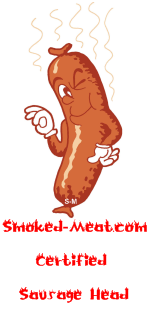Have a friend making jerky with no cure. I have suggested just for the reason of cure highly reducing the chance of botulism it should be used but they still are not adding a cure.
Am I over reacting with my concern. I know over a hundred years ago just salts were acceptable but feel this being 2014, the price of cure being relatively low, extending storage and reducing the chance of botulism to friends and family making jerky without cure isn't advisable.
Looking forward to everyone's thoughts. ..
Am I over reacting with my concern. I know over a hundred years ago just salts were acceptable but feel this being 2014, the price of cure being relatively low, extending storage and reducing the chance of botulism to friends and family making jerky without cure isn't advisable.
Looking forward to everyone's thoughts. ..


 There's your answer.
There's your answer.
 Depends on what they put in it. My recipe doesn't use it. Its got vinegar, sugar, and salt in it. From what I've read they are a form of cure/preservative. That being said, since I joined here I add cure. Its cheap and simple to use plus I have it on hand. So why not.
Depends on what they put in it. My recipe doesn't use it. Its got vinegar, sugar, and salt in it. From what I've read they are a form of cure/preservative. That being said, since I joined here I add cure. Its cheap and simple to use plus I have it on hand. So why not.





Comment